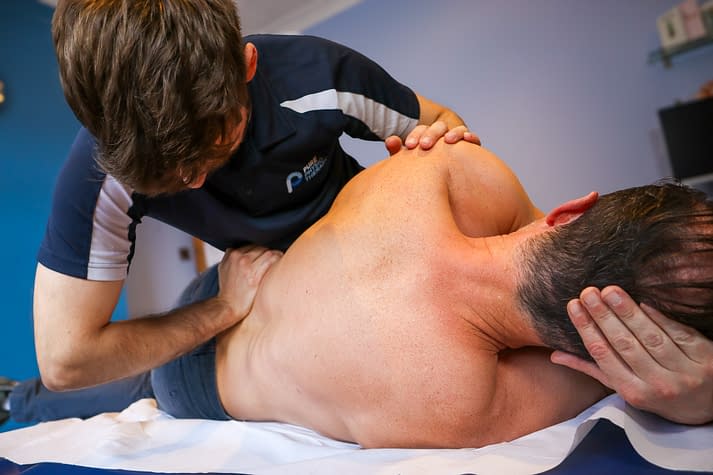What Is It?
Low back pain is one of the most common causes of musculoskeletal pain in the world. Most people will experience some degree of discomfort or pain and lower back during the course of their lives. This pain can also be accompanied by symptoms irritating the sciatic nerve and referred pain which travels down the gluteal or buttock area into the back of the leg or hamstring and down to the calf and even the foot. This sciatic pain, which is often termed sciatica, is typically a symptom of issues around the lower back and pelvis which gives a referral pattern into the leg.
Low back pain can be caused by a large range of different underlying triggers. These can range from disc related problems to joint issues in the lower back, through to muscular nerve another soft tissue components. Low back pain is the most common problem treated in our physiotherapy clinics. All our physiotherapists are highly trained to assess the symptoms, diagnose the underlying cause, and work with you to create a treatment programme which will see the symptoms resolve as effectively as possible. In some instances, further support may be required from your General Practitioner or even imaging such as X-rays or MRI scans with a view to getting potentially surgical involvement.
Assessment & Treatment

In most cases, patients presenting with low back pain with sciatica respond very well to a combination of advice and education around how to best manage their symptoms. This will be linked with targeted manual therapy and an exercise-based programme which is progressive over time based on the improvements that are seen. Usually, a course of treatment is required which can range from two or three sessions to slightly more if the symptoms are severe and take more time to settle.
Some people present with chronic low back pain which is where the pain is felt in the lower back to some degree on a daily basis. There is great value in seeking physiotherapy advice and treatment in these cases to ensure you are doing everything possible with regards to your daily activity, posture and movement, work habits and general lifestyle as well as exercise to reduce the symptoms and maximise your function. Even people presenting with osteoarthritis of the lower back who feel there’s nothing that can be done to help their back pain should seek advice on how best to manage the symptoms. We know through research, the vast majority of osteoarthritic symptoms can be managed exceptionally well through exercise, movement and lifestyle change.
Cauda equina
Thankfully the need for surgery is very rare in lower backs now. Latest research shows that in the vast majority of low back pain and sciatic symptoms, surgery does not offer significant benefit over appropriate conservative and physiotherapy treatment. If you are suffering with low back pain, possibly with sciatica, and feel a numbness or loss of sensation around your genital area or any bowel or bladder incontinence or retention which means you’re unable to go to the toilet, this could be an indication of a condition we termed Cauda equina. Cauda equina syndrome indicates a potentially dangerous compression of the nerves in the lower part of the back which can lead to long term issues of incontinence and disability. If you feel you have numbness or complete lack of sensation around the general area with or without bowel or bladder incontinence or retention or are unable to go to the toilet this would be an indication to seek advice from the local accident and emergency department as early intervention in this very rare but serious presentation is vitally important. It is important to stress that Cauda equina is very rare with experts estimate that Cauda equina syndrome affects 1 in 30,000 to 100,000 people per year around the world. If you attend Pure Physiotherapy with low back pain your physiotherapist will ask questions around the possibility of pathologies or presentations including Cauda equina to ensure your safety and allow us to provide the best possible care.
Book Online Today
If you have low back pain, whether it’s acute and been there only a short period of time, or chronic and causing suffering for months or even years, you can be assessed and advised by one of our expert musculoskeletal spinal physiotherapists. They will work together with you to give you appropriate rehabilitation plans, advice and education which will help to put you on the best possible track to reducing your pain, improving your movement, and allowing you to function as best possible enjoying your life to the fullest.